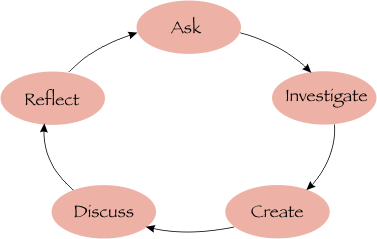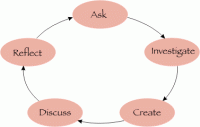Inquiry-based learning is difficult to describe in a fixed and straightforward way (see Other definitions of inquiry-based learning). When viewed from a curricular perspective, it is often seen as a process that provides opportunities for learners to engage in the practices of life beyond the classroom — using the tools and methods of scientists, artists, problem solvers, or citizens in society — to gain a deeper understanding of themselves and the world around them. This process is situated, personal, action-based, social, and reflective. It is also a critical process, one that questions received knowledge and social structures, and even its own processes. Thus, it invites a continual questioning of what it means to teach and learn, what counts as knowledge, and what meaning or action follows from learning. The very notion of inquiry-based learning must itself be subject to this critical examination.
 Most versions of inquiry learning see a continuing cycle or spiral of inquiry (Bruner, 1965), one version of which is shown here. This is a model for how people engage in inquiry, such as those proposed for the process of writing or Dewey’s (1933) for thinking. Some such models emphasize immersion in phenomena prior to more focused investigation; this is what Hawkins (1965) calls “messing about”. Others emphasize action growing out of the inquiry. For example, liberatory education (Freire, 1970) conceives two stages, one in which people become aware (conscientized) of their oppression and a second, which builds upon the first, in which they transform that state (praxis).
Most versions of inquiry learning see a continuing cycle or spiral of inquiry (Bruner, 1965), one version of which is shown here. This is a model for how people engage in inquiry, such as those proposed for the process of writing or Dewey’s (1933) for thinking. Some such models emphasize immersion in phenomena prior to more focused investigation; this is what Hawkins (1965) calls “messing about”. Others emphasize action growing out of the inquiry. For example, liberatory education (Freire, 1970) conceives two stages, one in which people become aware (conscientized) of their oppression and a second, which builds upon the first, in which they transform that state (praxis).
There is usually a strong caution against interpreting steps in the cycle as all being necessary or in a rigid order. In fact, inquiry learning is less well characterized by a series of steps for learning than it is by situated learning (Lave & Wenger, 1991). This is a phrase describing how learning happens as a function of the activity, context and culture in which it occurs, rather than through abstract and decontextualized presentations. People thus learn through their participation in a community of practice. Learning is a process of moving from the periphery of a community to its center, that is, going from legitimate peripheral participation to full enculturatation. Most of this process is incidental rather than deliberate.
Inquiry-based learning is manifested in a variety of curricular and instructional approaches, which can be roughly grouped according to the aspects of the inquiry cycle they emphasize. For example, the open school movement of the 1960’s invited students and teachers to look beyond the realm of textbooks to the larger community in the formulation of questions for study. Problem-based learning sets the formulation of questions as a task for the learner. An emphasis on rich, authentic materials for investigation can be seen in materials-based and research-based curricular approaches. Project-based learning emphasizes the creative aspects of learning through extended projects and performances. Discussion and collaboration are important in cooperative learning and in much of the writing process work. Response-centered classrooms highlight the reflective and constructive aspects of meaning-making.
- Ask: open school; problem-based learning
- Investigate: materials-based, open-world; resource-based learning; investigation-based, research-based learning
- Create: project-based learning
- Discuss: cooperative learning; writing process
- Reflect: constructivist learning; reader response; service learning
The nature of pragmatist inquiry is such that it can never be far removed from practice, including the complexities of communities and the historical situatedness of actual human practices. There are good how-to books for inquiry, but many of these focus on a specific setting, e.g., middle-school mathematics learning, in a way that makes it difficult to apply ideas outside of that setting, much less to consider possibilities of learning across settings, such as collaborative learning among university students and young people in a community center. Thus, the apparent practicality of some sources actually leads to difficulty in applying the ideas in different contexts. In order to do justice to inquiry in learning, we need to have rich examples situated within theory and intellectual history as well as in the everyday realities of learners.
References
Aulls, Mark W., & Shore, Bruce M. (2007). Inquiry in education, volume I: The conceptual foundations for research as a curricular imperative. Erlbaum.
Benson, Lee, Harkavy, Ira, & Puckett, John (2006). Dewey’s dream: Universities and democracies in an age of education reform. Temple UP. Combines intellectual history of pragmatism, with a special emphasis on Dewey in Chicago, and practical ideas about how universities can engage with communities today
Berdan, Kristina, et al. (eds.) (2006). Writing for a change: Boosting literacy and learning through social action. Jossey-Bass. How to promote community-based writing.
Boyer Commission on Educating Undergraduates in the Research University (1998). Reinventing undergraduate education: A Blueprint for America’s Research Universities.
Bruce, B. C. (Ed.) (2003). Literacy in the information age: Inquiries into meaning making with new technologies. Newark, DE: International Reading Association.
Bruner, J. S. (1965/1960). The process of education. Cambridge, MA: Harvard University Press.
Dewey, John (1933). How we think: A rethinking of the relation of reflective thinking in the educative process. New York: D. C. Heath.
Hawkins, David (1965). Messing about in science. Science and Children, 2(5), 5-9. Reprinted (1974) in The informed vision: Essays on learning and human nature (pp. 63-75). New York: Agathon.
Jeffs, Tony, & Smith, Mark (eds.)(1990). Using informal education. Open University Press.
Khan, P., & O’Rourke, K. (2005). Understanding enquiry-based learning. In Barrett, T., MacLabhrainn, I., Fallon, H. (eds), Handbook of enquiry and problem based learning. Galway: CELT.
Koschmann, T. (Ed.)(1996). CSCL: Theory and practice of an emerging paradigm. Erlbaum.
Resource sites
- Centre for Inquiry based Learning in the Arts and Social Sciences (CILASS), University of Sheffield
- Centre for Leadership in Learning, McMaster University
- infed–”provide a space for people to explore the theory and practice of informal education and lifelong learning. In particular, we want to encourage educators to develop ways of working and being that foster association, conversation and relationship.”
- Inquiry Page–virtual community where inquiry-based education can be discussed, resources and experiences shared, and innovative approaches explored in a collaborative environment.
- Institute for Inquiry-provides workshops, programs, online support, and an intellectual community of practice


Pingback: Engagement and Two Forms of Social Change | Martin Wolske's Weblog
Pingback: Project / Problem Based Learning « Blog on Collaborative Learning
Pingback: A Model of Inquiry Learning | Information Learning Nexus
Pingback: Questionaire 2 | Information Learning Nexus
Thanks for your comments, Noriah!
I’m not sure of a specific person or place to recommend, but I’d look at journals such as Computers and Composition if you had a special interest in computer-based approaches, or TESL-EJ for more general ESL issues. Then, see which articles are closer to your interests and use that as a way to identify programs. You can also follow the references on the posts here to find some people, and then their academic units. But of course, not all of those are academics and not all are even alive. Since your interest is in ESL students writing, you could pursue a PhD through Education, Writing Studies, or some linguistic programs.
Good luck with your quest.
LikeLike
Hi,
I am impressed with the info you include in this site!Great work.
I am interested in doing a phd research on the use of Inquiry-based learning method to enhance ESL students Writing, performance.
Do you know the best people I can contact for help in this particular area (related to my topic)
Thank you.
LikeLike